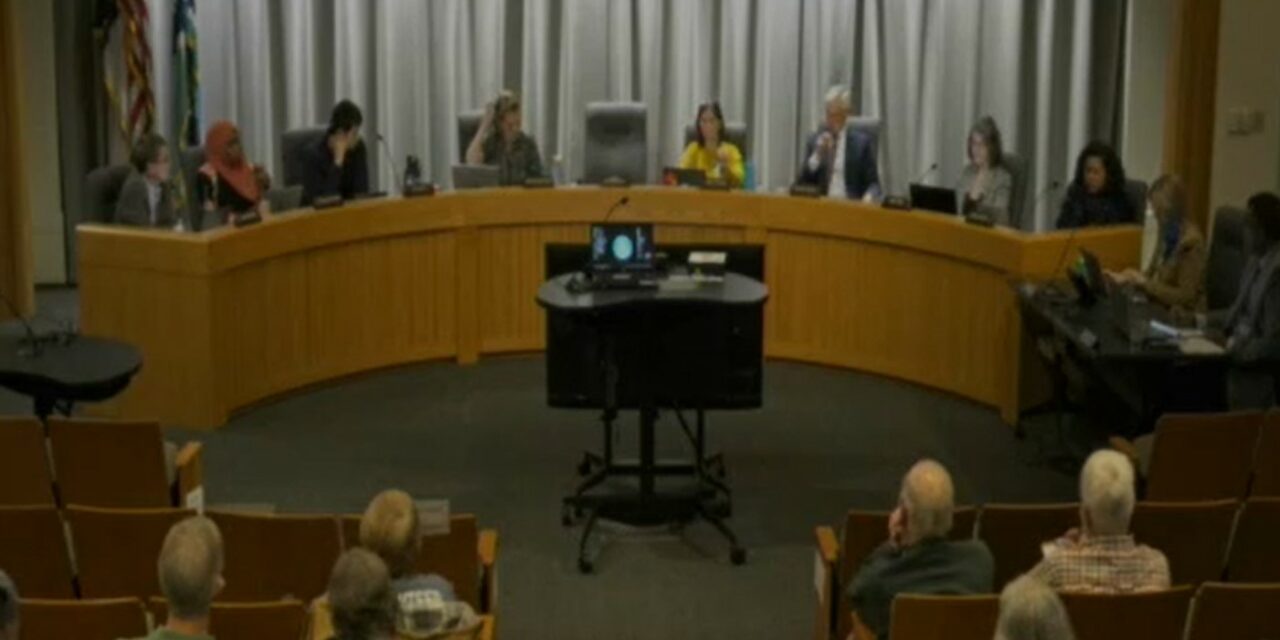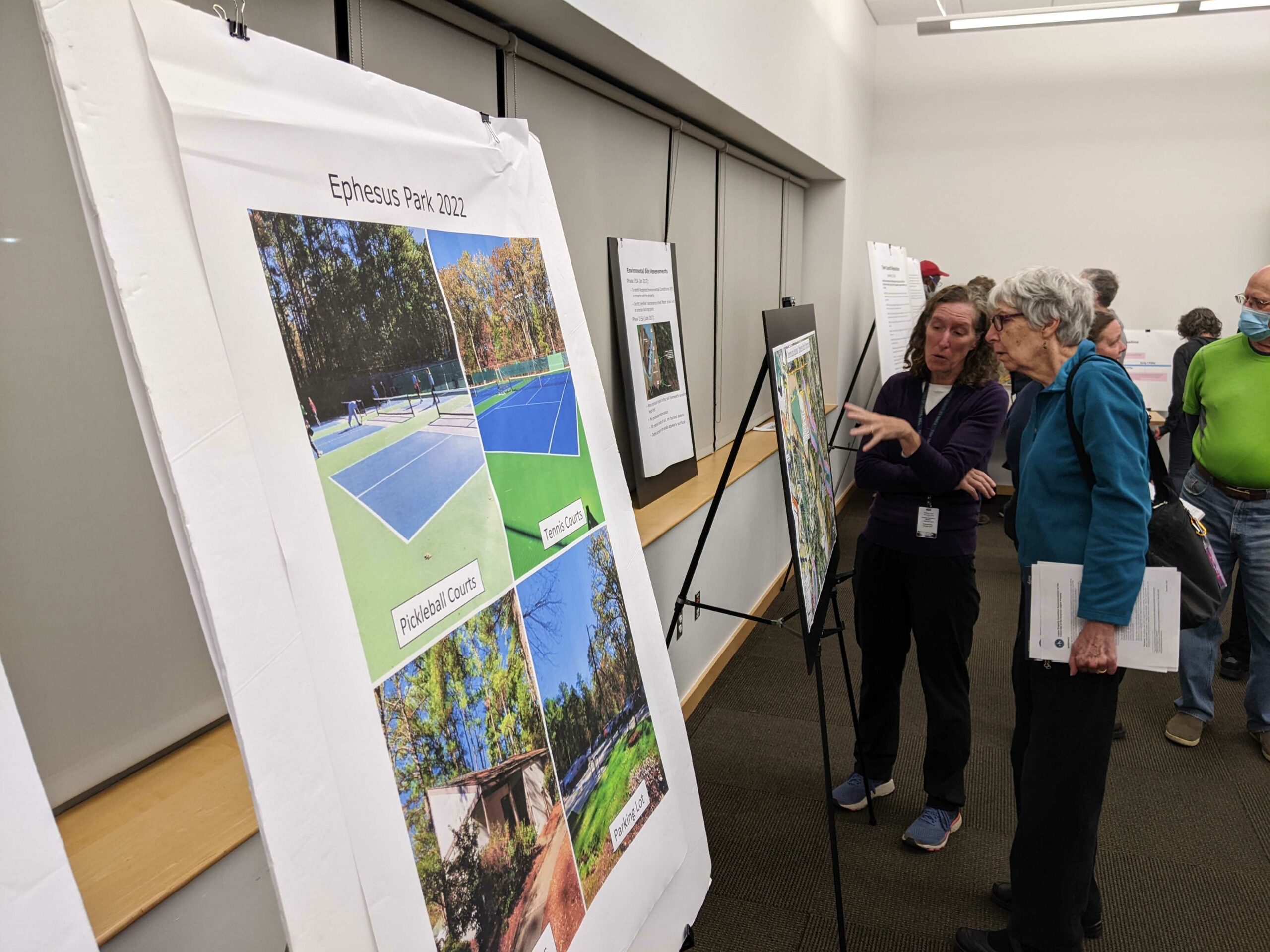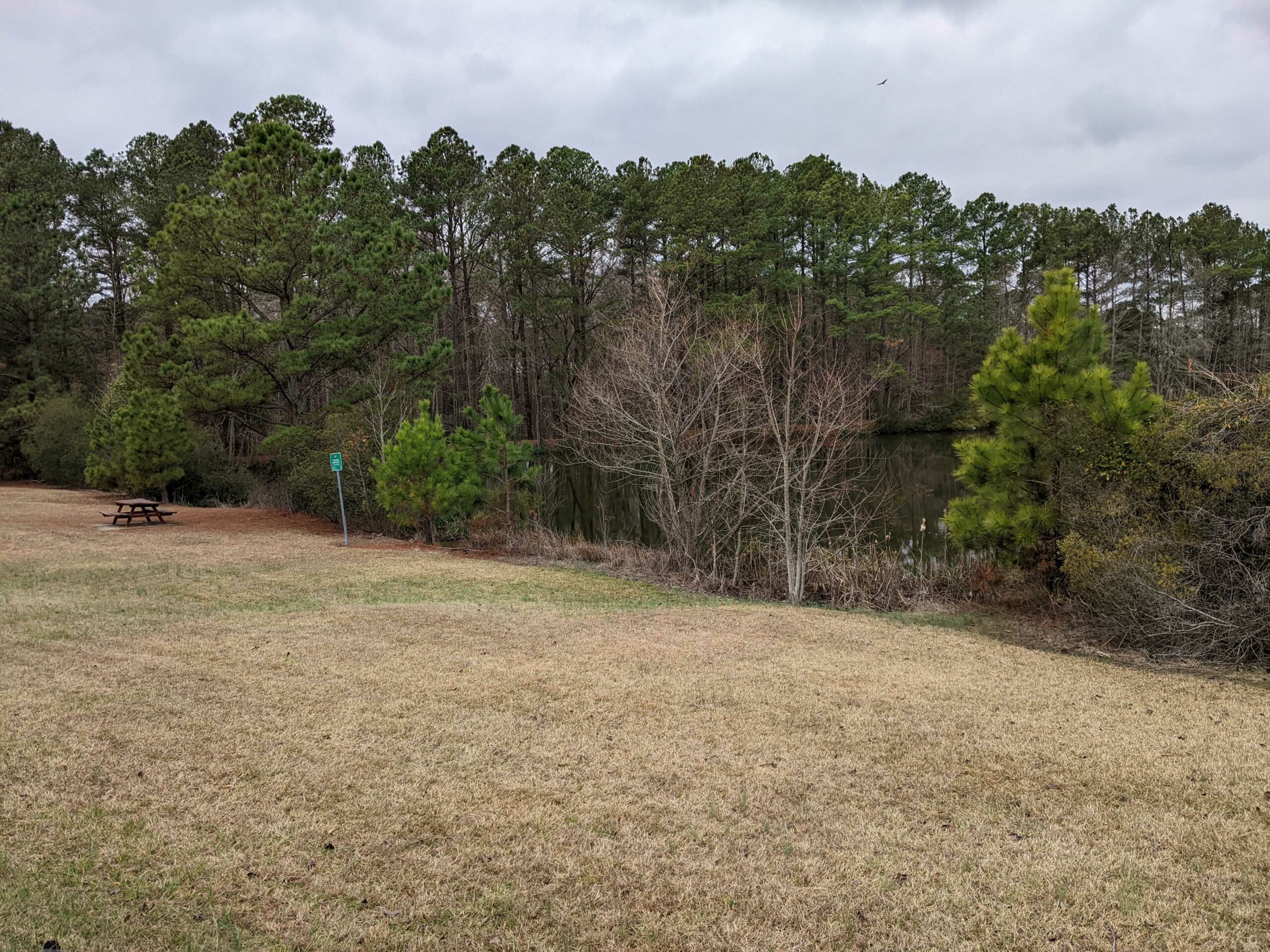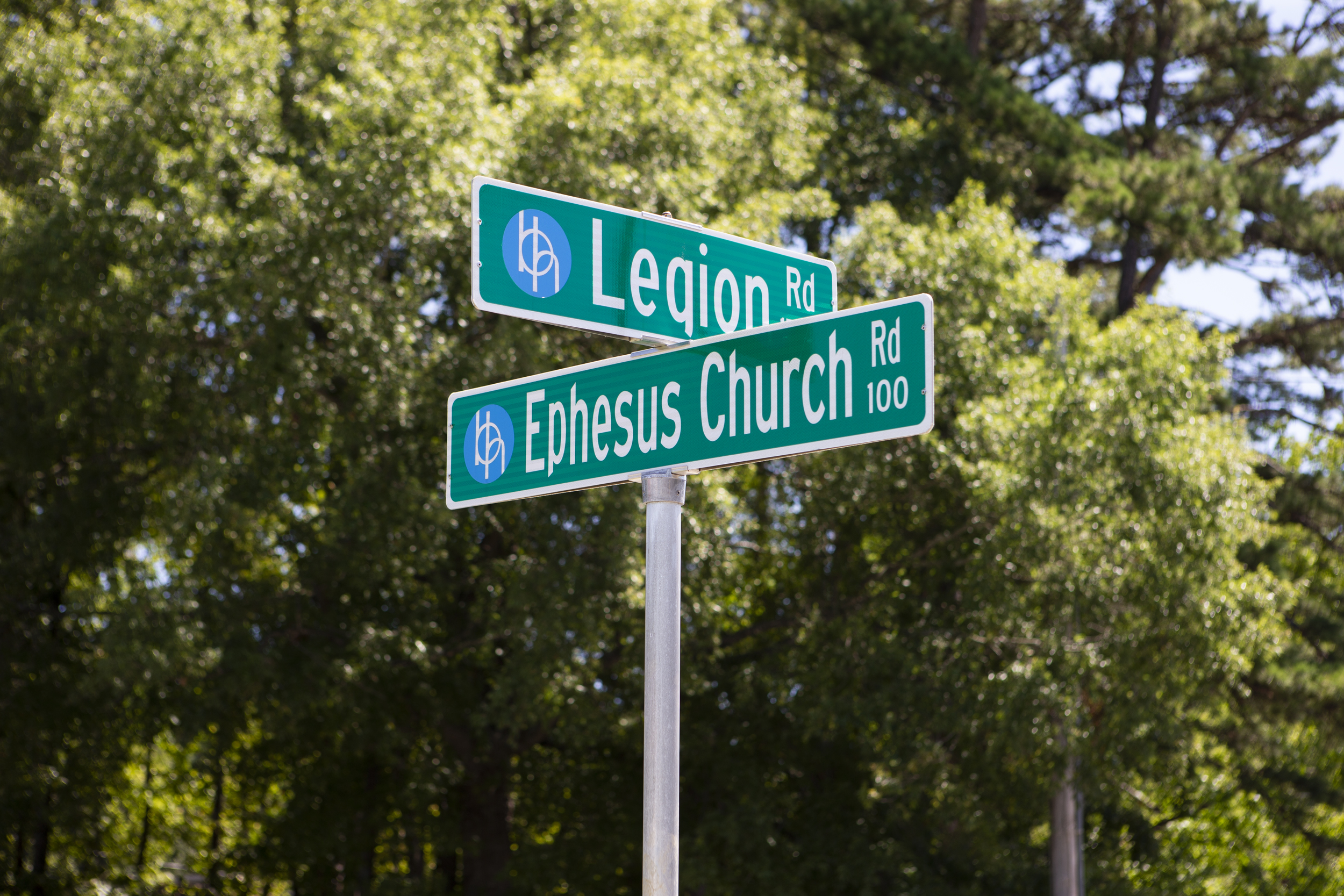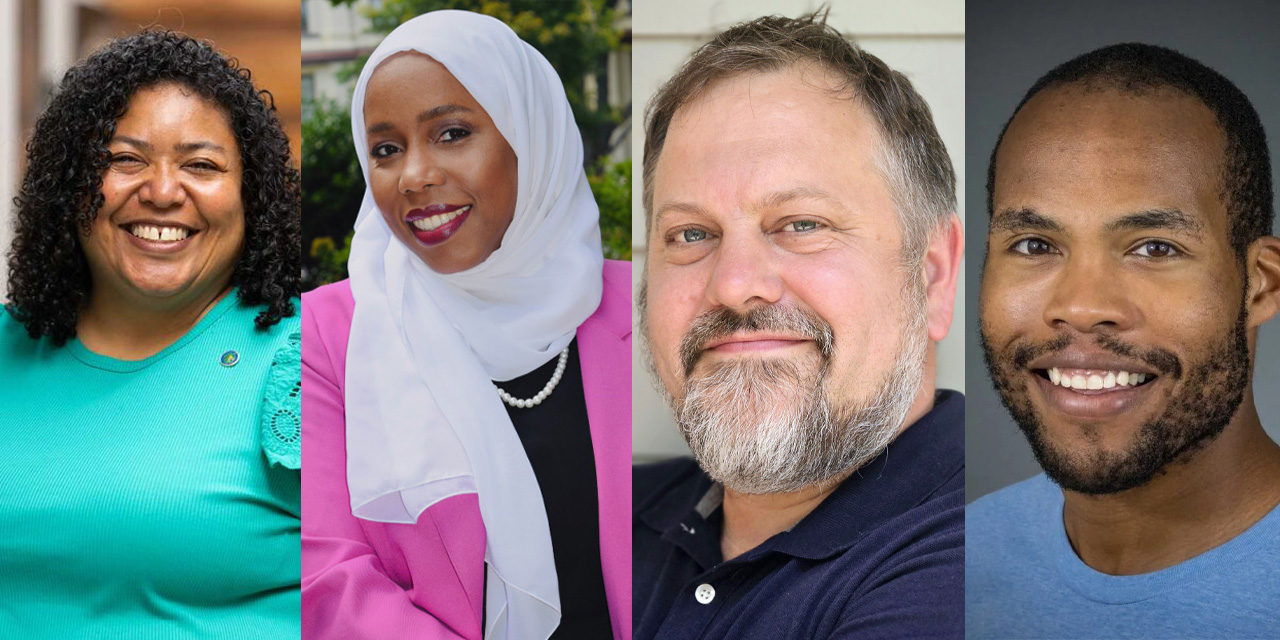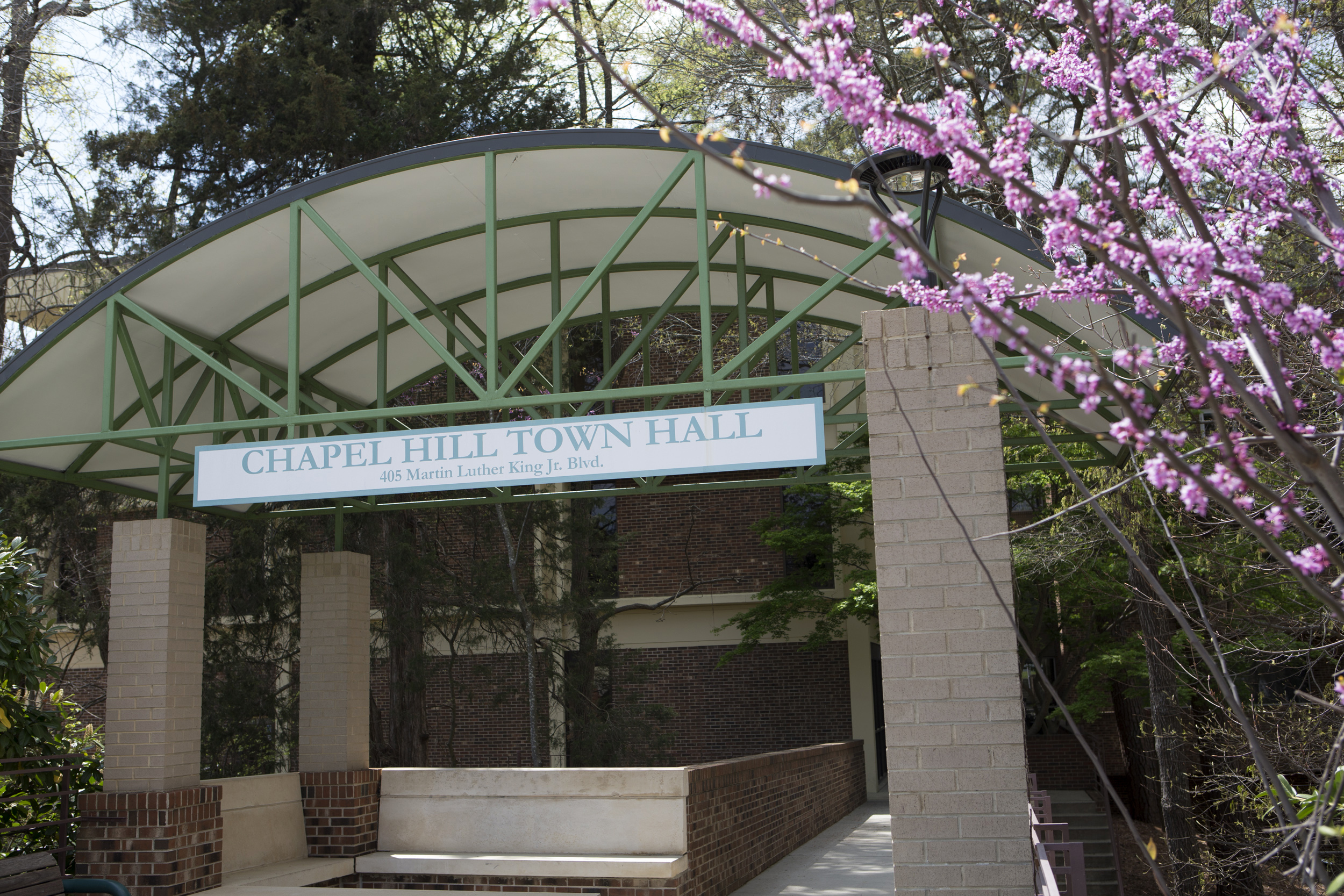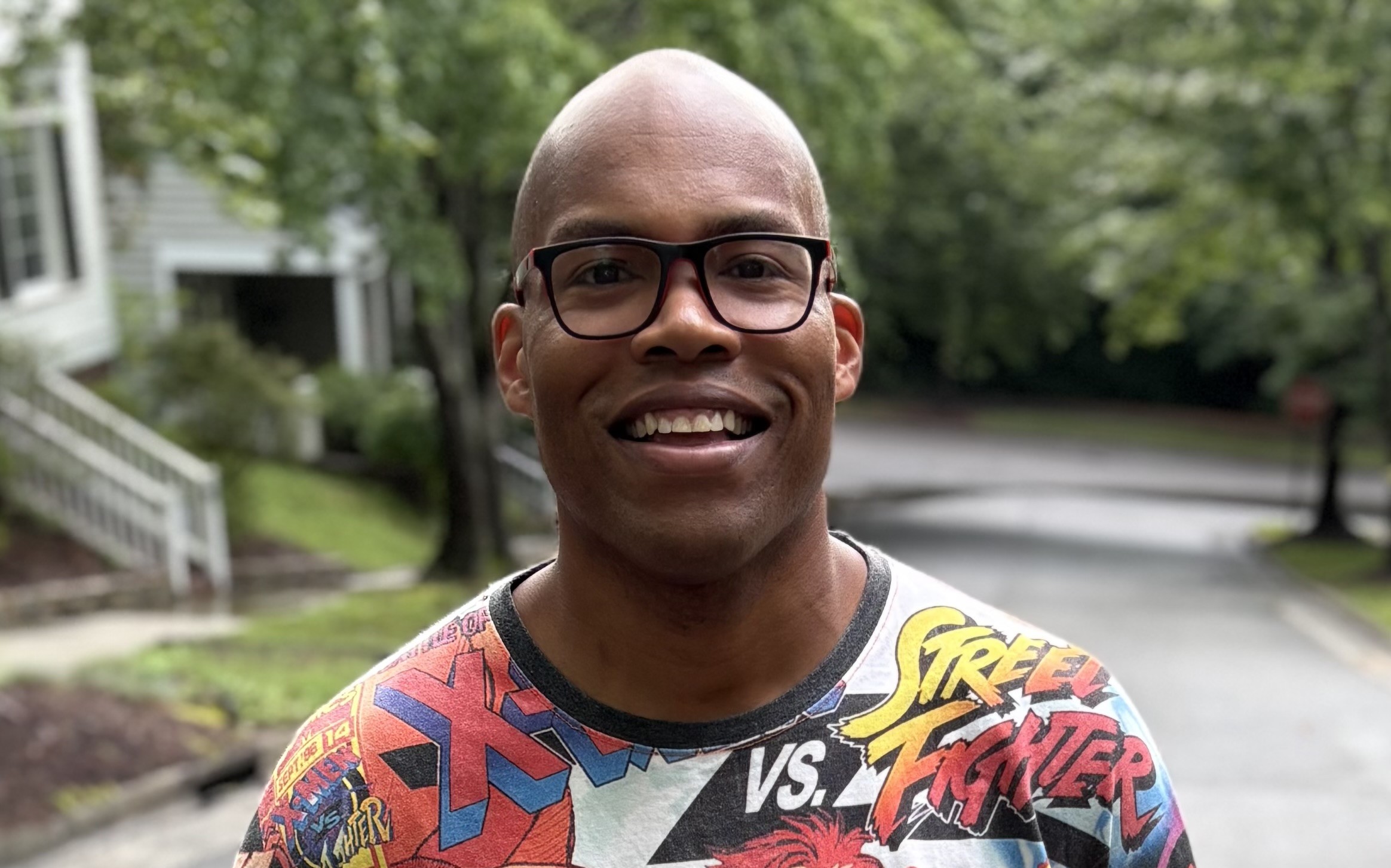The Chapel Hill Town Council voted on Wednesday to move forward with a broad plan for the property it owns at 1714 Legion Road, approving a plan to combine land with the nearby Ephesus Park and reserve 8 to 9 acres for eventual affordable housing. The site, which was previously owned by the local American Legion, was sold to the town in 2016 and the local government’s initial resolution indicated it would be used for both a park and some residential purposes.
Council members voted 7-1 in favor of the updated outline for the property’s future — Council Member Adam Searing voted against it and Chapel Hill Mayor Pam Hemminger was not present. Here is a transcript of the full comments shared by Chapel Hill Town Council members ahead of their vote, with some lightly edited for clarity. Video of the meeting can be found here.
Karen Stegman
“There is a resolution that’s part of the information I think that’s probably available out there. But the key pieces of that are: to combine 27 acres of the Legion property with the Ephesus Park — which is 11 to 12 acres — to create a new town park that would have passive and active recreation. And: to reserve 8 to 9 acres along the Legion Road frontage for affordable housing. Those are the key points. There’s some process steps in there, but that’s more or less what we’re voting on tonight — and to move forward with the planning process under those guidelines. So, we will have comment from council before we vote.”
Jess Anderson
“Thank you to everyone who came out to speak or is listening from home. I think this resolution represents something that I’m really proud of on this council, which is compromise. We did have different opinions on this council about certain things [involving this land.] I felt strongly that we shouldn’t sell off part of the property because we’re not making more land. And I didn’t think the amount we would get, um, from selling the property would really make a dent in what we want to do for a park. Folks on this council had different ideas about that. And it wasn’t that anybody was morally right or wrong — we had different ideas. And so, a subset of us came together and came up with a compromise. That’s what I think community is about. And that’s what we do on this board: we represent the entire community, and we try and find something that’s healthy for all of us to move forward. Something that doesn’t just make one person happy. In fact, when we make nobody happy, we’re probably doing something right.
I believe that two things can be true at once. This side of town does desperately need a park. We did use some money to buy the Legion property with money that was for parks. And a lot of this property will continue to be a park. So, I feel that we have fulfilled our obligation there. We are going to be building more densely moving forward. For those of you who were here earlier, we are moving in a new, new direction. And I’m really excited about it, because it’s about doing things in a planful strategic way that leads us to better outcomes. This is not going to be what we’ve done in the past. We are doing things differently where housing and environment go together. They go hand in hand. We cannot be a healthy community without both.
I can also say that having been on this board for almost eight years. Every time we say we want to do affordable housing somewhere, somebody comes and says, “I support it, but just not here.” And that means we can’t do it anywhere if we don’t put it somewhere. And guess what? It’s gonna be in a lot of somewheres — everywhere that we own property. We need to put affordable housing. We also need to put green space. We need to figure out how we can have a beautiful pond or other things that are important to us, how we can support butterflies, how we can do other amazing things in our communities. These are not mutually exclusive issues. They cannot be. We will be building a along green ways. We will be building into nature. This is what we want to do all over town. And I want to unabashedly show my support for that new vision that has taken us a year to create a year to put together.
We know that we can’t solve the affordable housing crisis here in Chapel Hill. No municipality can do that. We also have a moral and just practical obligation to work against the market forces, to work against the deficits from the federal level, from the state level in terms of policy and funding to make sure that we are allowed and that I have the privilege and we all have the privilege of living with our nurses, our bus drivers, our teachers, those with disabilities, and those for whatever reason, cannot afford to have a home. And our community has set over and over again strongly that we care about both and that’s what we need to do moving forward. So I look forward to moving forward together. Also, I think we really need to think about how we talk to each other in this community. Sometimes it doesn’t matter at some point what this ends up being, if we can’t in some way work together on these type of issues and care about each other, even when we disagree.
I’ve heard of people heckling their neighbors over this issue. I went to a vigil for a child who was hurt in a crosswalk and one of my neighbors heckled me from streets away over development. I think, at some point, we are letting the national toxicity seep down to a level where we are losing our humanity. And I think we need to really think about — regardless of which one we care about more parks, our environment — how we speak to each other and how we care about each other in this community. Because we do all care about important things, but it’s not worth giving up our humanity over a park. So, I look forward to moving forward together and working out how we are going to have a wonderful park and how we are going to have wonderful affordable housing at the same time. I look forward to working with my colleagues and with the community to make that happen.”
Adam Searing
“When I was thinking about what to say tonight, I was considering how this property’s always really been a park. Like some of the speakers here tonight, when I was a kid, I used to play in Legion Park. I’d get chased off by the Legionnaires half the time. But you know, one of the best times was one of the vets took me over to the pond and was teaching me how to fish. That was a special time. So, it’s always been used as a park. And thinking about the debate that we’re having I think we do forget one thing in my view: we’re a town.
We’re a town because we come together and we do lots of different things. We’re not just a state park or a national forest. We have parks and we have woods — they’re disappearing a little bit, but we have them — but that’s not what we do. We’re a town. By the same token, we’re not a housing developer. A few weeks ago, I was really proud to vote for $9 million for six new affordable housing projects, many of which are already under construction. I’ve visited the Weavers Grove project, it’s just fantastic what Habitat’s doing. But this is one thing we do. We’re not a housing developer.
We’re also not a shopping mall. You know, we want to take care of our businesses downtown. One of the things we’re in the process of doing is building a $39 million parking garage. The cost of that went up another $9 million and we added that on a few weeks ago. Because we want to make sure that we have people coming downtown and seeing, seeing our businesses. But we are still a town — that’s not our main goal. We have to do all these things.
But there is one priority where we really aren’t spending much money at all. And that’s our park system. That’s really sad. If you look at our 2013 parks plan, it says, ‘Let’s build a park in the East Chapel Hill. We need a bunch of courts. We need some more fields.’ We’re doing almost none of those things in the past decade. For example, a decade ago, our kids came to us and said, ‘We need a new skate park just like Durham, Raleigh, Lexington, Apex. We want a modern skate park.’ We haven’t turned one spade full of earth on that skate park. And almost eight years ago, parents of kids with complex medical needs and disabilities came to us and they said, ‘We need an adaptive playground, so all our kids can come and enjoy being outside.’ We’ve been studying that and looking at that and thinking about it. We haven’t turned one spade full of earth in eight years on that adaptive playground. A few years ago, even more parents came to us and said, ‘You know what? We need a splash pad. Apex has one. Fayetteville’s got 12.’ We really, really want one — we’re studying it, but we haven’t turned one spade full earth on building a splash pad.
We actually spend the least per capita of any town in our area on our parks capital needs. We’re doing some maintenance — that’s good, but we’re not building the stuff that our community wants and that’s bad. And because we’re a town, that’s one priority we’re not doing. So when I think about this debate, is it any wonder that so many people are upset when the one big thing we’re doing about parks is that we’re going to come in and take a third of this unofficial park, drain the pond that I learned to fish in, and build some housing on it. No matter how much we need that housing…that’s one of our other priorities, but we have to do everything for our community. And no wonder people are upset. That’s what we’re doing on our parks? The idea that we’re gonna have some sort of amazing park on the land that’s left… I mean, if we can’t turn a spade full earth for a desperately needed skate park that our kids have been asking us for [for] a decade, and that every other single community around here has done, how can we expect you as the people in Chapel Hill to trust us on the council? That we’re going to somehow build an amazing park on what’s left of this property? I would say to you, you would be justified in being very skeptical about our commitment to do that.
Remember I was talking about the $9 million we just voted in for six new affordable housing projects? Well, I know I’m a supportive affordable housing and I know that the folks who support affordable housing are gonna be coming back to us and saying, ‘We need a new bond issue for affordable housing. We need some more funding for affordable housing.’ But you know what: that money doesn’t come from me. A little bit does, just like anybody else in this community. But it comes from everybody in this community. If you want to do all of the projects we need, we’re asking for that funding not from us: we’re asking it from all of us in this room. For the people who want the park who live near Legion Road and who desperately need a park and for everyone else.
I would really urge us tonight to remember that we can do both of these things and we do have multiple duties and priorities. But we should vote this down because we need to invest in our park system. It’s one of the priorities we’re just not doing in town.”
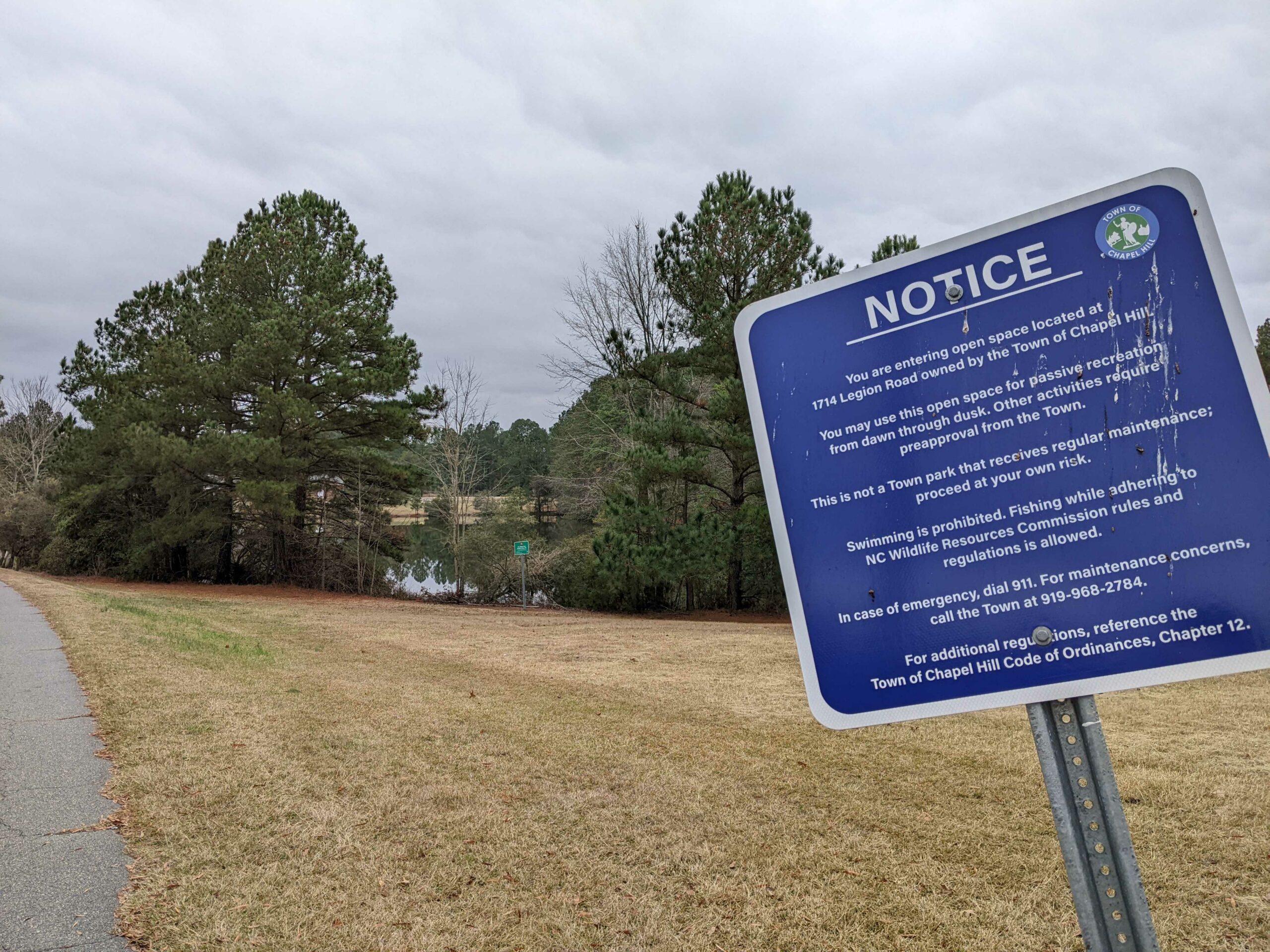
A Town of Chapel Hill sign on the 1714 Legion Road property, describing its role as an open space. According to the plan approved on December 7 by the town council, around 27 acres of the land is set to be an extended community park with added recreation features.
Tai Huynh
“A few thoughts for me. The first is: I’m very excited for us to begin the preliminary next steps. I’m pretty bad at math, but by my estimate, this seven-year process has gone on for a little over a quarter of my lifetime. So, putting that in perspective, it feels like pretty long before we’ve actually made any decision to proceed. I’m glad that we’re finally able to make some very preliminary steps towards a resolution that can support a great compromise and support more than one of our priorities. And I think a priority is just that: a priority. If everything is a priority, how can something be a priority? I’m very proud to be part of a town that punches way above its weight class in terms of affordable housing and prioritizing the need for shelter for members of our community who provide vital services, like our teachers.
In the past decade we’ve invested, yes, millions and millions of dollars [in housing]. But by our own estimates, our shortfall of affordable housing is still in the thousands of units. 80 percent of our renters are still cost-burdened, including a lot of the ones in a lot of the apartments that are full in the Blue Hill District. So, we need more housing everywhere we can get it. And I think our new way of doing things, of building into nature, can help us achieve more than one priority at a time. Because I also believe that we are fully capable of being able to achieve more than one priority at a time. I think we bring up examples of Raleigh and Apex and all these other [towns] that have invested tons of money into parks and stuff. If we can also build enough housing to add 80 to 100 people a day in our community, I think then we can consider some of these other things.”
Michael Parker
“I just want to say how proud I am tonight to be able to move forward with this resolution. I was part of the council that purchased this property. We voted on [it] almost exactly to the day seven years ago. We actually acquired it in the following March. It was always our intention to have a mix of uses, and affordable housing was hoped to be one of those uses. So, for me personally, it’s just really rewarding that we are able to move forward with providing affordable housing for 150 families, or [some amount] in that neighborhood. We know we need it, it’s desperately needed. We don’t have a lot of town land options. That’s just how it is.
I just also wanted to respond to a couple of things that have been said this evening, particularly about the pond. As we’ve mentioned during the presentation, the dam is failing and that pond will have to be drained in order to repair it. What gets put back, we don’t know yet — based on land conditions, hydrology, [we will learn] whether we’ll be able to replace the dam, keep the pond, at it’s full size…probably not. It is at least plausible that there will be a pond there, although somewhat smaller in size to make it work better. But we don’t know that yet. Regardless of whether we do nothing or we do anything, the dam has to be replaced. The pond has to be drained and then once we understand how it’s fed [and] what the hydrology is, we’ll be able to make an intelligent decision about what the right path forward is. I think that’s really important to keep in mind.
The other thing I wanted to talk about… One of the other things that I’m really proud about that we did tonight was approve the Complete Community framework. I think that’s really going to be just groundbreaking for our town. I’m really looking forward over the next many years how our town evolves as a result of it. In a lot of the conversation, [when we say] ‘complete community,’ we were talking about buildings and greenways and physical features. But I’ve always believed that the most important thing about Chapel Hill is our people. And doing a ‘complete community’ means that we also provide for a diversity of people in Chapel Hill. It is about greenways, it is about nature, it is about good design. But more important than anything else, ‘complete community’ means that you’ve got a diversity of people. [It’s important] that the people who serve other people in our town get to live here if they want. The people who protect us, the people who put out our fires, the people who take care of us when we’re ill — that they get to live in the town in which they work.
And so ‘complete community’ is physical, but it’s fundamentally about the people. That’s why I am really excited and proud. As Council Member Anderson said, I think what we have been able to do in Chapel Hill in a microcosm provides a lesson for what doesn’t happen at the state legislature or what doesn’t happen in our federal government right now. [It] is the ability of people who have good intentions, who care deeply about their, their town, country, state, to come together in spite of their differences, bridge those differences and come up with a plan that meets multiple priorities. And ultimately [it] helps those in our community who can’t advocate for themselves, who need our help. So, I am just really so pleased that we’re able to do both Complete Community earlier and now move forward with this resolution.”
Amy Ryan
“I’d like to thank everybody who’s come out tonight and who came out in the past and shared their passion for parks and for ponds and for forests and for housing and for equity. That word ‘and’ is key. This doesn’t need to be an ‘either-or’ discussion about who benefits and who loses. It’s about using town resources to accomplish multiple goals, as my colleagues have said, and to bring multiple good things to Chapel Hill. I’m very glad that we didn’t move forward with earlier proposals to sell any of the land for private development. And I’m glad that we’re committing to preserve almost nine acres of stream corridors and forests on the site instead of building there. Those are huge wins for everyone. I’m also pleased that we’re creating opportunities for the people who serve our town — the teachers, the hospital workers, the grocery store employees — to live in the place they work near good schools and jobs and stores and transit.
Tonight we’re taking an important step in that process. I think we’re setting a broad vision for the property. There’s still a lot of details to be worked out, but we’re gonna have a large, 35-acre park with recreation and preserved natural space, and we’re gonna have much needed affordable housing. I love the ‘building into nature’ [phrasing]. That’s kind of the vision. I think it’s a decision we’re celebrating and I thank all my colleagues who work so hard on this issue and, again, who come together despite some differencing point of views and come up with a plan that really works for our town.”
Camille Berry
“I also want thank all those who are still with us. those who were with us but had to leave, those who attended last week. And… I appreciate that the staff opted not to do a presentation that night, rather to provide information ahead of time and also have information there posted that evening. Because what that did was allow me to hear more, live, from individuals that evening. I have received the emails, I have read the emails, and I do appreciate them. I really attempt to listen with curiosity. You may see me up here with my head bent quite often. It is because I’m taking notes and I take notes so that I can capture the words and somewhat distance myself from the emotion. Because I want to make sure I hear what you were saying…each of you.
And what I heard tonight was concern for your town… now and in the future, from every single one of you who, who came and spoke. What I heard was concern for your loved ones — whether they’re related to you or you work beside them, or you serve them, or they serve you. What I heard was concern that we are not living up to our responsibility. What I heard was concern that we are not trusting each other. What I’m hearing from my colleagues here is we are working really hard to trust each other. We are working really hard to hear each other. We are working really hard to honor, to respect, what you have placed in our care, which is the care of this town.
Every one of us brings our perspectives to it. We don’t look at it the same way. I was actually one of the individuals who was convinced that we should sell part of the park to recoup some of that money that we spent [on the property’s purchase]. I have been convinced that, no, that it’s not in the best interest of this town. If you remember earlier tonight, I talked about how I was extremely resistant to spending more money on yet another consultant. We are a town that loves education. We are a town that loves to study and that is my concern. But I’m very glad that we made the investment.
Parks…are we investing enough? I don’t think so. I really don’t. We do have park amenities that we have not invested in to maintain. That is a concern for me. Housing: congratulations to us, we invested $9 million. We need to invest more. If you know me and if you happen to talk with me, if you happened to hear me when I ran for council, I asked and I answered the questions very directly. I didn’t demure. I was very direct. ‘If there’s an opportunity to build housing, I want to explore it.’ When the question was put to me by Anne Brashear at a gathering outdoors in Colony Woods with Pam Hemminger, ‘Should we keep it a park? All of it?’ And I said, ‘No.’ I told you then and I’m telling you now: I want to have both [affordable housing and a park] here, and it is quite possible.
I’m a former executive director of Durham Central Park: an urban park in downtown Durham, a 5-acre park that was reclaimed wasteland. I do not want to repeat what happened there. If you recall earlier tonight, I talked about exploring, experimenting and assessing. One thing that I regret is that we made that park, that 5-acre park, beautiful and wonderful….and the housing that went up around it is so expensive. We have the opportunity to turn this gem in to something that we don’t have to fear. We are concerned about that pond. It’s something that we can use, that we can take solace in. We can take those walks, and I actually do take walks [there]. We have the opportunity to take care of the land. We also have the opportunity to house. And we’re not talking about one third, we’re talking about one fourth. And we’re not talking about that entire one fourth being construction, being asphalt.
Please look at me, please look at your neighbors — and I’m talking about the neighbors who continue to live outdoors. I was housing insecure. I was homeless. I know the weight of not knowing where you’re going to sleep. I know the weight of worrying for your children. I know the weight of [thinking], ‘What happens if something happens to me, what happens to my children?’ There are individuals in this room grappling with that decision. We have the opportunity to address both of those. We are a town. We’re a town that is embracing complete communities. It won’t be perfect. I’m not going to promise you perfection. But I am going to promise you the effort to make it a park that we’re all proud of, that we all can access, that we all can take solace in. And: more housing that a few more people can find, shelter in, can find comfort in.”
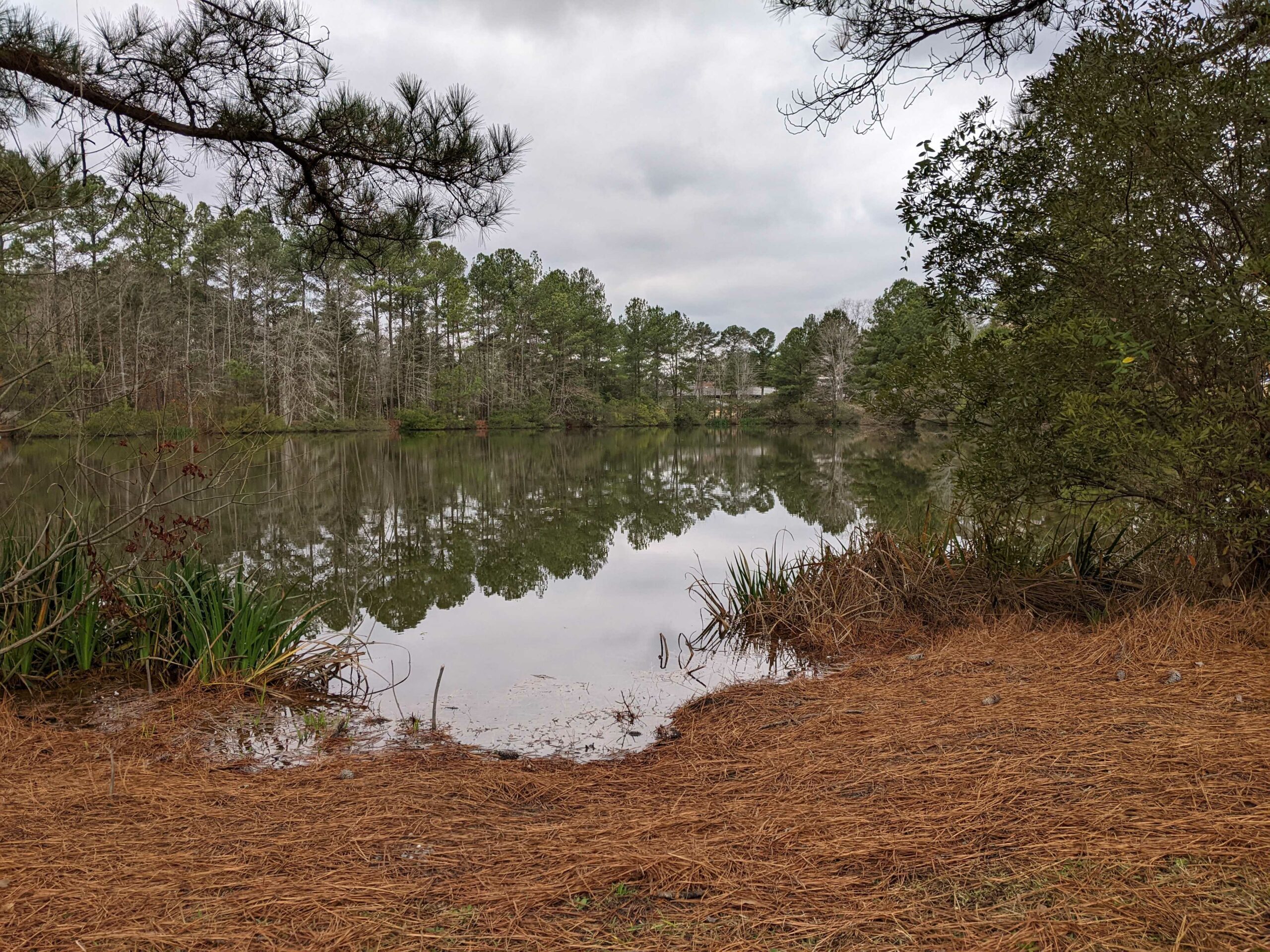
The pond at 1714 Legion Road was man-made in the 1960s. The Town of Chapel Hill says the pond’s earthen dam and, if it is to remain, will need to be repaired.
Pam Hemminger (written statement)
“Tonight, as your mayor and as a longtime Chapel Hill resident, I feel very fortunate to be having a conversation together about how we as a community will utilize the Legion property. In 2016, after a previous council had passed on purchase of the Legion Property, a new council — which included council members Anderson, Parker and me — worked with our staff to come up with the funds to purchase the 36-acre site. Had we not taken that step, there would be apartments on that property today. Instead, tonight, we have options before us and opportunities to meet much needed community needs and priorities.
Over the years, there has been a lot of community interest in the possibilities for this property. Tonight, it’s time for us to take a first step forward. For me, as mayor, the purchase of the Legion property for the the town is one of my proudest accomplishments. And after many years of community conversation, I’m excited to begin work to create a place that our entire community can benefit from and enjoy. Looking ahead, there will still be much work to be done — but for tonight, I would like to take a moment to be grateful and to celebrate the possibilities that this property holds for our entire community, for generations to come.”
Chapelboro.com does not charge subscription fees, and you can directly support our efforts in local journalism here. Want more of what you see on Chapelboro? Let us bring free local news and community information to you by signing up for our biweekly newsletter.

